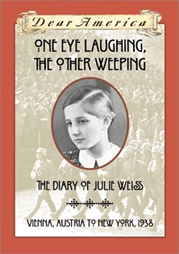
When I was in grade school, Thursday was my favorite day of the week. Why Thursday, you may ask? Because it was the day my teacher allotted time for us to head down the hall to the school library. Library was a loose term for the small space that was not much larger than a college dorm room, but I didn’t care. I was a few feet high at the time and lost in the wonder of the worlds I could visit every time I crossed the threshold. I would head straight for the bottom shelf just to the right of the librarian’s desk and stake my claim on a Black Lagoon book I had already read 12 times. After that, I would wander the shelves and see what caught my eye.
One day on my trip through the historical fiction section of the stacks, I pulled down a book called Dear America: One Eye Laughing, the Other Weeping. This was my first introduction to the Dear America series, which includes Dear America, Dear America Royal Diaries, and My Name is America. What makes this series unique is that each book is written as a diary entry from the perspective of a fictional child representative of children who grew up during the time period of the book or lived through the event(s) the book features. One Eye Laughing, the Other Weeping tells the story of Julie Weiss, a Jewish girl in Austria around the time of Hitler’s rise to power.
I have always had a passion for history, but One Eye Laughing, the Other Weeping did something to me that no other history-related book had before: it made history personal. Julie was a young girl, close to my age at the time. It wasn’t hard to picture myself in her shoes as I read and experienced her confusion at the state of the world she lived in. I understood how Julie couldn’t wrap her head around the hate she saw and experienced because I couldn’t either, and if I’m honest, I still can’t. The only thing Julie and I had in common was our age and gender, but that was enough to bond me with the fictional girl and open up a new perspective on the past that would alter the way I viewed history.
Though Julie Weiss was a fictional character and the words she wrote in her diary the work of an author, she helped me see the humanity I think so often gets lost in history. I was use to viewing history as places and dates, key events and significant figures, but Julie taught me history is so much more than those things. History is people. It isn’t an abstract number on a page, it’s a woman left to raise her young son alone after learning her husband was a casualty of Pearl Harbor, it’s a young man drafted overseas to fight a war on foreign soil he played no part in starting. And in Julie’s case, it’s a young girl ripped from her family and friends, stuck in a new country and left wondering what about her skin and religion made people hate her enough to murder her kind.
The more we study the past and hone in on the personal element of history, the more we realize the significance of the subject. If history is people and we are people, then history is us. It’s our loftiest dreams and impulse decisions, our messiest failures and greatest successes. Whittled down even more, it is our words and actions, or lack thereof.
If we acknowledge the personal element of history, we also have to acknowledge our role in it. We don’t live in a vacuum, our present will be someone else’s past and set the stage for someone else’s future. I think the weight of that knowledge causes us to live a little differently, or at least it should. We have a duty to those who came before us to be better, to do better, and to live better. We have a duty to those who will follow us to make sure the world is a better place for them than it was for us. And we have a duty to ourselves to live a life and create a narrative for our own story that we are proud of.
Because in its simplest form, that is history.
-Emily VanderBent
Junior Girl
Girl Museum Inc.
